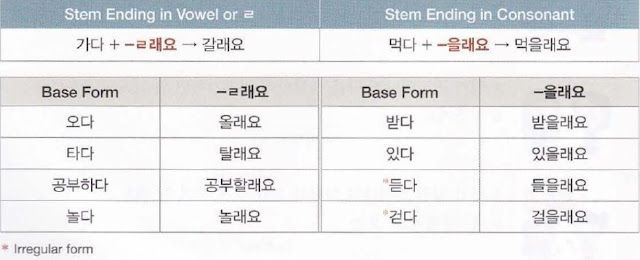 너무 배가 불러요. 그만 먹을래요.
너무 배가 불러요. 그만 먹을래요.
I’m so full. I’m not going to eat anymore.
커피 마실래요.
I’ll have coffee (to drink).
이번 방학에는 여행을 할래요.
This vacation, I’m going on a trip.
Grammar Focus:
-(으)ㄹ래요 expresses the fact that the speaker has the will or intention to do something. It is used often in colloquial language among intimates and does not confer a feeling of politeness. This meaning corresponds to ‘be going to’ or ‘will’ in English. Used in questions, it is a way to ask the other person his or her intention (See also “-(으)ㄹ래요: Asking Opinions and Making Suggestions” here). When the verb stem ends in a vowel or ㄹ, -ㄹ래요 is used, and when it ends in a consonant, -을래요 is used.
 1. This expression can be used only with verbs.
1. This expression can be used only with verbs.
• 저는 키가 클래요. (X)
->저는 키가 컸으면 좋겠어요. (O)
I wish I were tall.
• 저는 예쁠래요. (X)
->저는 예뻤으면 좋겠어요.(O)
I wish I were pretty.
• 호앙 씨는 다음 주에 고향에 갈래요. (X)
->호앙 씨는 다음 주에 고향에 갈 거예요. (〇)
Hoang will go to his hometown next week.
->저는 다음 주에 고향에 갈래요. (〇)
I’ll go to my hometown next week.
Conversation:
A: 하미 씨, 이따가 액션 영화 볼래요, 공포 영화 볼래요?
Ha-mi, do you want to see an action movie or a horror movie later?
B: 저는 공포 영화는 싫어요. 액션 영화 볼래요.
I don’t like horror movies. I want to see an action movie.
A: 뭐 드실래요? What would you like to drink?
B: 저는 커피를 마실래요. I’d like some coffee.
A: 오늘 리라 씨의 생일 파티에 안 가요?
Aren’t you going to Lila’s birthday party today?
B: 네, 안 갈래요. 피곤해서 집에서 쉴래요.
No, I’m not going. I’m tired, so I plan on resting at home.
>> V-(으)ㄹ래요? ① Asking Opinions and Making Suggestions: Click here
>> Full of ‘Korean grammar in use – Beginner’: Click here
>> Fanpage: Say Hi Korean
